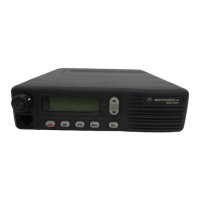152
Individual ID A system key or FTR key is required to access this field. Enter the Trunking
Individual ID in hexadecimals. The Individual ID is a number that
uniquely identifies an individual radio on a system (or personality for
Type I). Type I systems have a unique ID for each personality.
For Type II/IIi radios, valid IDs range between 1 and FFFF. The decimal
equivalent of the Individual ID is used for the radio's Private
Conversation Call ID (7+ID#), interconnect land-to-portable unit calls
(7+ID#) and interconnect land-to-portable talkgroup calls (7+ID#).
Type II systems have a single Individual ID per radio, independent of
the number of talkgroups, user groups or personalities that radio has
on that system.
Access Type Use the UP/DOWN arrow keys to select the Trunking Access type:
Note: This information must be coordinated with your system
manager to ensure proper operation of the system.
Conversation Type Use the UP/DOWN arrow keys to select the Trunking Conversation
type. The options are:
Tx Defeat Use the UP/DOWN arrow keys to enable/disable this feature. When
this feature is enabled, the radio will use the PFI instead of the
Universal ID to initiate individual calls.
The default is Disabled.
This Call ID A system key or FTR key is needed to access this field. This is the Type I call
ID which is calculated from the Size Code, Fleet ID and Individual ID.
Slow The original Trunking signalling protocol with
acknowledgments (high speed) for all channel grants.
(Rx = Slow, Tx = Slow)
Fast An enhancement to the original protocol that eliminates the
channel grant acknowledgments, thus improving the channel
access time. (Rx = Fast, Tx = Fast)
Message After the initiator de-keys the radio, the voice channel
stays active (hangtime) so that other members of the
talkgroup can respond on the same channel. If a radio in
the talkgroup transmits during another user's
transmission, he or she will interrupt the ongoing
transmission.
Transmission No hangtime and no talk-over. When a radio is de-keyed,
the channel is immediately de-allocated and reassigned. If
the user tries to talk over an active channel, the radio will
not respond until the channel is clear.

